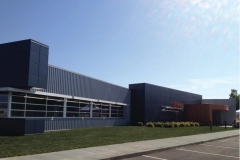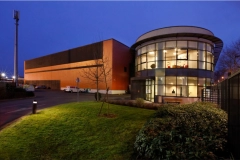Microsoft Begins Using Eco-Diesel in Data Center Generators
Microsoft Begins Using Eco-Diesel in Data Center Generators
Microsoft will use low-carbon renewable fuel to provide emergency power for its cloud region in Sweden, the company said today. The backup generators at a new Microsoft data center in Sweden will run on Evolution Diesel Plus, a fuel that incorporates tall oil, a renewable byproduct of forestry and paper production. The “Eco-labelled” diesel is made by Swedish energy company Preem, which has worked with Caterpillar to ensure it will work in the generators at the Microsoft Azure cloud data center, which is scheduled to begin operating later this year.
The announcement advances Microsoft’s goal of ending its reliance on diesel fuel by the year 2030 as part of its goal to be carbon negative. The eco-diesel contains more than 50 percent renewables, and thus will have half the carbon impact of using petroleum-based diesel.
“The use of Evolution Diesel Plus at Microsoft datacenters in Sweden is a step on the path toward the commercial and technological innovations necessary for cleaner, 100 percent renewable synthetic fuels applicable for the decarbonization of hard-to-abate industries,” said Noelle Walsh, Microsoft’s Corporate VP for Cloud Operations and Innovation.
Microsoft Azure is one of the largest cloud computing platforms, with infrastructure in 53 regions around the world. The company has also been a leading customer of data center developers, leasing hundreds of megawatts of capacity from companies that provide wholesale data center space.
Alternative Fuels as Transition Strategy
As a result, ditching diesel will be hard, and eco-diesel is just one element of Microsoft’s broader innovation program. Switching to less carbon-intensive fuels is a logical first step, as it protects the massive investment in generators by both Microsoft and its data center service providers.
“Diesel fuel accounts for less than 1 percent of Microsoft’s overall emissions, but finding solutions to reduce reliance on traditional diesel fuels represents a substantial contribution to the technology pathways necessary for deep decarbonization,” Walsh wrote in a blog post. “The most immediate opportunity to reduce the use of traditional diesel fuels is to validate and implement alternative, lower-carbon fuel sources for our generators.”
Preem says its Evolution Diesel works in all vehicles with diesel engines, including cars, tractors and trucks. Microsoft worked with Preem and Caterpillar to ensure that Evolution “offers the same technical performance as traditional fuels, with fewer net emissions.”
“Preem wants to be part of the transition to sustainability and today invests significant resources in developing the market’s most sustainable fuels,” said Christian Bjerdén, VP Head of Sales at Preem. “The collaboration with Microsoft and Caterpillar bodes well for the future”, says Christian Bjerdén, VP Head of Sales at Preem.
Innovation in Backup Power
Microsoft has been working for years to develop effective alternatives to the use of diesel generators, citing the need to make its data centers more sustainable and less reliant on the utility grid. but continues to install large numbers of generators at new data centers. Microsoft first announced its interest in reducing its use of generators in 2012. Since then, it has tested several alternative approaches.
- In 2014, Microsoft outlined plans to power portions of its facility in Cheyenne, Wyoming with biogas waste from a water treatment plant.
- In 2017, the company created an Advanced Energy Lab in Seattle that powered 20 racks of servers with fuel cells powered by natural gas, teaming with McKinstry and Cummins on the project.
- Last year Microsoft said it ran a row of 10 racks of Microsoft Azure cloud servers for 48 hours using a 250-kilowatt hydrogen-powered fuel cell system at a facility near Salt Lake City, Utah. Since most data center power outages last less than 48 hours, the test offered a strong case that fuel cells could be used in place of diesel generators to keep a data center operating through a utility outage.
- In March Microsoft and French energy company Total established a partnership to assess the long-term feasibility of deploying large batteries as backup power for critical infrastructure, working with Total’s battery specialist subsidiary, Saft.
“We are innovating and piloting other backup power sources in our data center regions, which could in the future provide viable replacements to generators,” said Walsh. “Batteries already supply short-term backup power needs, filling the roughly 30-second gap between a potential outage on the grid and the time it takes to power up the diesel generators. In the future, batteries with a longer duration could replace the role diesel generators play today.
“On the path to 2030, we are continuing to innovate and partner to create and implement viable solutions to eliminate dependency on traditional diesel fuels. We look forward to sharing more progress on this journey along the way,” said Walsh.
More >> Microsoft Begins Using Eco-Diesel in Data Center Generators


